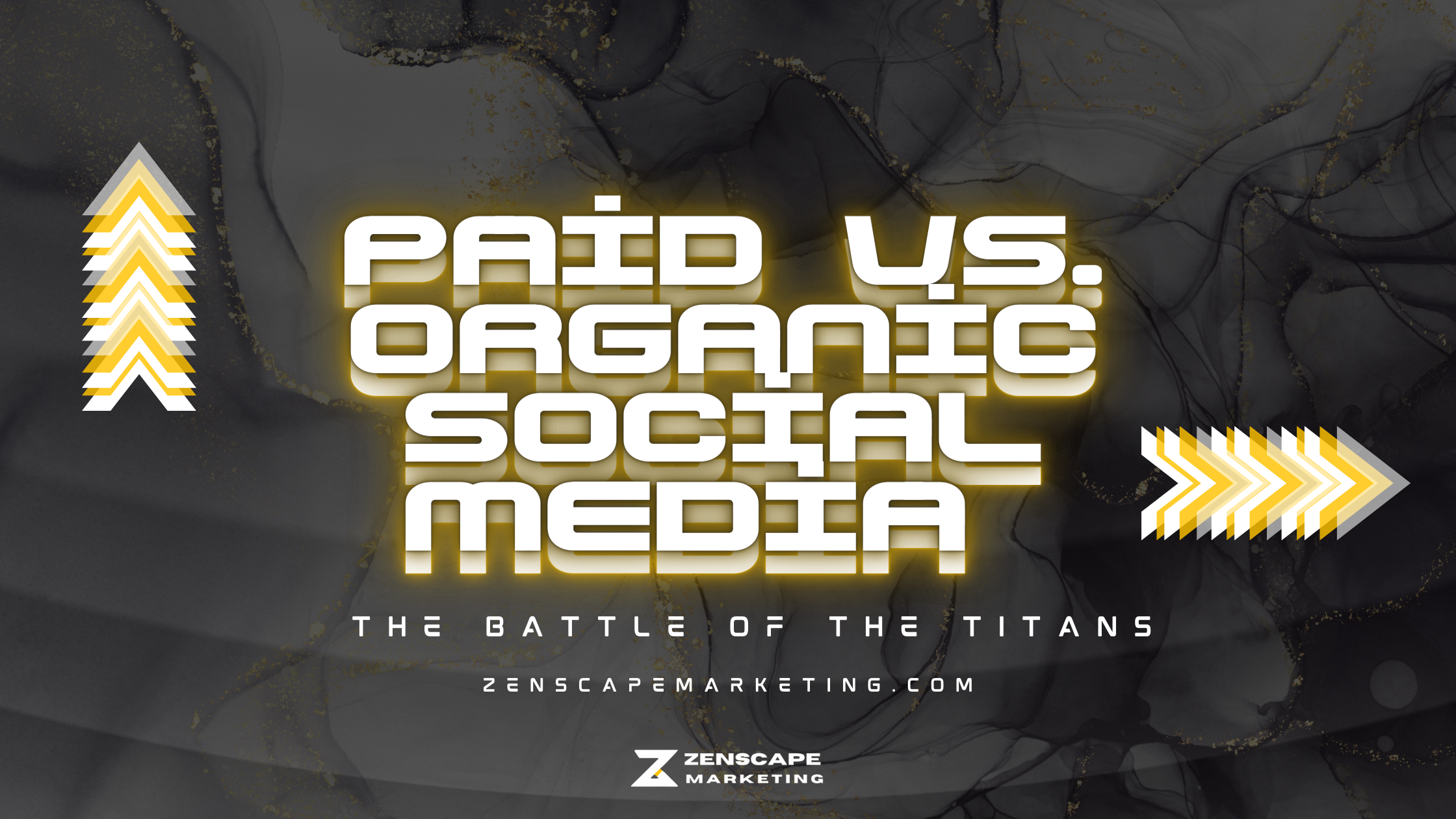Social media has become indispensable to marketing strategy. 93% of marketers say social media marketing is important for their business. But there is an ongoing debate within social media marketing – should companies focus on paid social campaigns or organic social media? This is the battle between paid vs. organic social efforts.
Understanding the Basics Paid vs. Organic Social Media
Organic social media refers to unpaid social efforts like posting engaging content on your brand profiles, responding to customers in comments and messages, using relevant hashtags, running contests and polls, leveraging user-generated content, and more. The goal is to grow your followers and engagement through non-paid, community-building strategies.
Paid social media refers to social advertising – running ads on platforms like Facebook, Instagram, Twitter, LinkedIn, Pinterest, and more. You pay for the reach and visibility as you promote your posts and target specific demographics. The aim is to boost brand awareness and drive direct conversions with a defined ad budget.
The Power of Organic Social Media
A strategic organic social media presence provides immense value:
Building Meaningful Relationships.
Organic social media allows you to foster authentic connections with your audience. Engaging with followers and providing value through consistent content builds genuine relationships. These human connections keep fans loyal and engaged with your brand long-term.
Cultivating Brand Advocates
Active organic social media cultivation leads to a thriving community of brand advocates who organically spread the word about your products or services. Satisfied, engaged followers drive referrals and word-of-mouth marketing, which are some of the most effective forms of promotion.
Enhancing Brand Reputation
Staying present and delivering value on organic channels enhances brand reputation and trust. Positive and consistent organic social media interactions compound into greater authority and credibility for your brand.
Long-Term Value
Unlike paid ads that stop when campaigns end, organic social media delivers value that continues building over the long term. The followers, relationships, user-generated content, and authority you gain continue to pay dividends. New York has grown an enormous organic following of millions of people through compelling visual storytelling and emotional brand-building. Their authentic community fosters highly engaged fans who actively interact with and share their content. This allows them to reach millions without any paid promotion organically.
However, organic social media does require patience and persistence. Building your community and seeing significant results can take months or years. You need engaging content and active community management consistently over time. But the long-term value is immense.
The Strength of Paid Social Media
In contrast, paid social media advertising offers key strategic advantages:
Immediate Targeted Reach
Paid social campaigns allow you to get your content and offer instantly in front of qualified audiences at scale. You control exactly who sees your posts through detailed targeting tools. This level of controlled reach and visibility would take years to achieve organically.
Measurable Direct Response
Paid social delivers trackable, measurable results you can optimize for. See exactly how many conversions, leads, sales, or other goals your campaigns produce. Measure ROI and adjust strategies based on hard performance data.
Rapid Testing Capabilities
The control and flexibility of paid social allows the swift testing of different creatives, messages, offers, and audiences. Rapid iteration and learning will enable you to optimize paid efforts to maximize your ad spend and impact.
During its IPO in 2021, trading platform Robinhood leveraged paid social media campaigns to target demographics interested in investing and trading. Their paid social efforts generated over $100 million in revenue from new signups.
The catch is that paid social requires a significant ad budget to compete and scale. Spending less than competitors means limited visibility. You also rely heavily on the advertising platforms themselves.
The Intersection of Paid vs. Organic Social Media
Rather than treating organic and paid social media as mutually exclusive options, they work together harmoniously:
Engage Your Audience with Organic, Reach New People with Paid
Leverage organic social media to engage, retain, and delight your existing audience. Then, utilize paid social media to put your brand in front of new demographics and grow your community further. Each plays a strategic role.
Transition Paid Traffic into Organic Communities
Use paid ads to attract high-intent visitors, then funnel them into joining your organic profiles and communities. This sustains growth long after paid campaigns finish as you build relationships with converted users.
A thoughtful combination of paid and organic strategies provides the benefits of greater visibility, conversions, and sales from paid advertising while building lasting brand equity and loyalty from organic efforts. The two approaches complement each other in a holistic
social media marketing plan.
Key Factors to Consider for the Right Balance of Paid vs. Organic Social Media.
Determining the right balance of Paid vs. organic social media depends on several factors specific to your business:
Business Goals and KPIs
Are you focused on brand awareness and engagement or direct conversions and sales? Short-term lead gen or long-term authority? Define your goals and key performance indicators to choose appropriate strategies.
Budget and Resources
Paid social requires significant ad spending and resources to manage campaigns. Organic needs a consistent presence and long-term engagement. Assess your budget and team bandwidth.
Target Audience Analysis
Do they actively use social media? Which platforms and formats? Look at their online behavior and preferences to determine optimal channels and content style.
Offerings and Positioning
Consider your products, services, and positioning. Awareness-building branded content may benefit more from organic. Transactional ecommerce can leverage paid acquisition.
Test and Adapt
Start by testing both approaches in parallel. Analyze the data to see what delivers best on your key metrics. Then, adapt your mix and continue optimizing.
Zenscape Marketing: Your Partner in Holistic Social Media Strategy
At Zenscape, our holistic social media services leverage paid advertising and organic community-building tailored to your business goals. Our experts help you:
Audit your social media efforts and define the ideal mix of paid and organic strategies.
Flawlessly execute multi-channel campaigns, from visual assets to copywriting to community management.
Continuously analyze performance and optimize your approach for maximum ROI.
Let us help you gain visibility and engagement through paid social while establishing lasting brand equity and relationships through organic social media.
Let Us Optimize Your Social Media Presence and Strategy
The lines between paid and organic social media are blurring as platforms evolve. Features like Facebook and Instagram Reels play in both spheres by offering organic reach through content and algorithmic discovery while providing paid promotion options. Emerging opportunities include leveraging influencer collaborations and user-generated content. These can start unpaid and organic by engaging your community; then, scale reaches rapidly through paid partnerships and amplification.
The debate between focusing efforts on organic vs. paid social media is nuanced. In practice, the two complement each other as part of an integrated strategy. By clearly defining your goals and thoroughly understanding your audience, you can determine the right balance to maximize your social media marketing ROI. With the help of experts like Zenscape, you can flawlessly execute that tactical mix across paid and organic channels.
Reach out to us today to audit your social media efforts and unlock the full potential of paid + organic strategies tailored for your brand!


